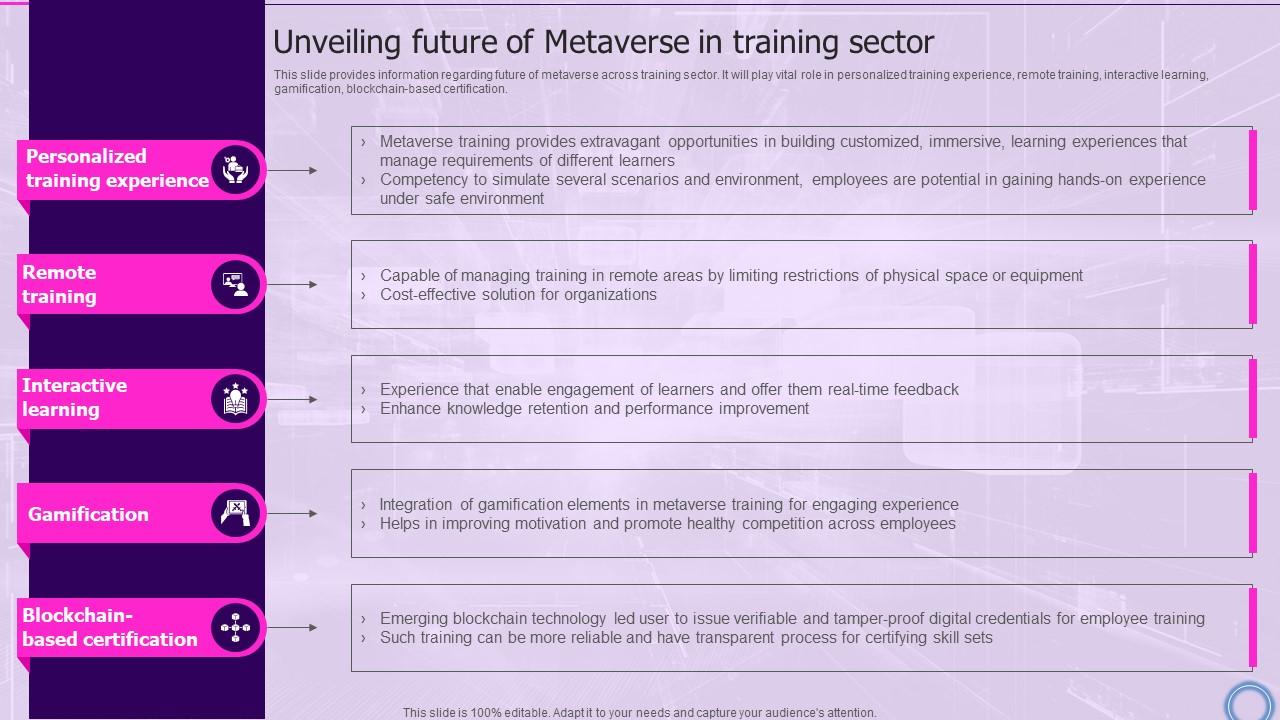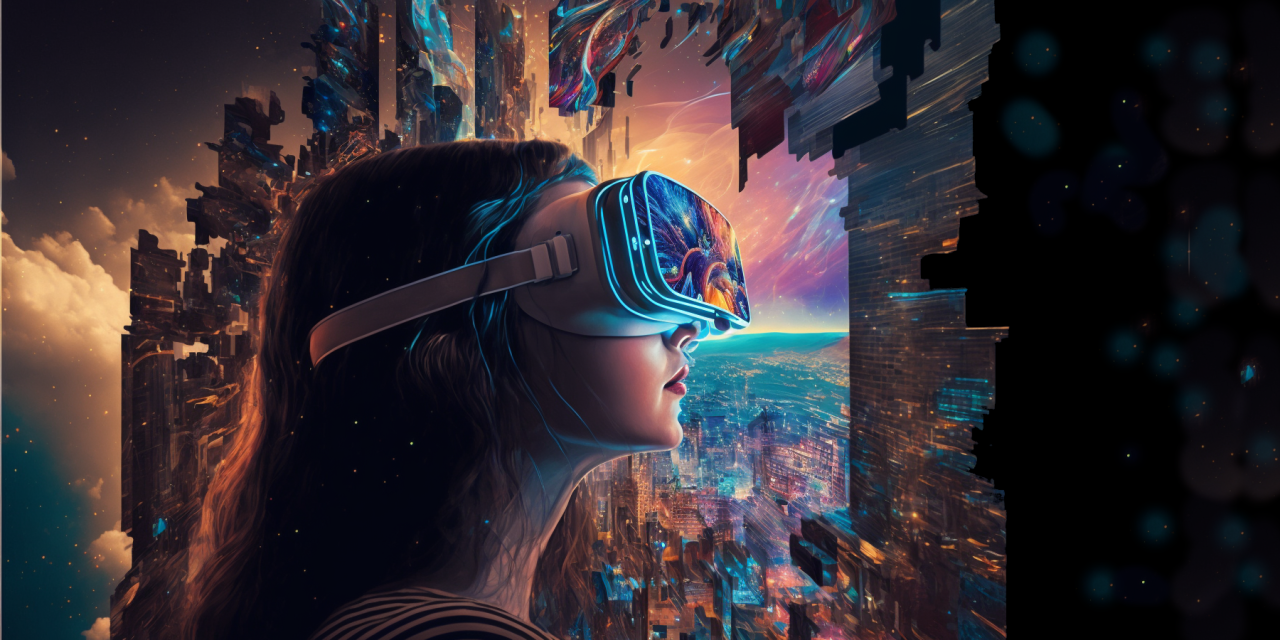
The Metaverse in the world of blockchain refers to a virtual, shared, and interconnected space where users can interact, transact, and create digital assets using blockchain technology. It combines elements of virtual reality, augmented reality, and blockchain to create an immersive and decentralized digital universe.
The concept of the Metaverse has gained significant attention in recent years, with companies and developers working on creating open and interoperable platforms for users to engage in various activities, such as gaming, socializing, commerce, and more. By leveraging blockchain technology, the Metaverse offers new opportunities for ownership, authenticity, and interoperability of digital assets, paving the way for a transformative digital experience.
As the technology continues to evolve, the potential applications and implications of the Metaverse within the blockchain ecosystem are vast and continue to fuel innovation and exploration.
Table of Contents
The Metaverse: A Digital Reality
Defining The Metaverse
The concept of the metaverse refers to a collective virtual shared space, created by the convergence of virtually enhanced physical reality and physically persistent virtual reality, including the sum of all virtual worlds, augmented reality, and the internet.
The Intersection Of Blockchain And The Metaverse
Blockchain technology is woven into the fabric of the metaverse, offering the security and transparency required for a digital reality where virtual assets and experiences are bought, sold, and traded.

Credit: www.slideteam.net
Unveiling The Potential Of The Metaverse
Metaverse, in the realm of blockchain, unveils new possibilities by creating a virtual space where users can interact and transact in a decentralized environment. It revolutionizes the way we experience digital assets and opens up a new era of possibilities for gaming, social interactions, and even commerce.
Creating A Shared Virtual Experience
The metaverse, a shared virtual space that is created by the convergence of physical and digital realities, is revolutionizing the way people interact and engage with each other. It offers a collaborative and immersive environment where users can interact, socialize, and engage in various activities in real-time. This shared experience blurs the lines between the physical and virtual worlds, opening up a plethora of possibilities for entertainment, education, and business.
Revolutionizing Social Interactions
In the metaverse, individuals can transcend geographical boundaries and come together in a seamless virtual environment. It redefines social interactions by providing a platform for people to connect, communicate, and form communities without the limitations of physical distances. Moreover, it fosters a sense of belonging and inclusivity, creating new avenues for social engagement and cultural exchange.
Transforming Digital Economies
As the metaverse continues to evolve, it is reshaping digital economies by enabling the creation and exchange of virtual assets, digital currencies, and decentralized applications. It introduces new economic models, virtual marketplaces, and opportunities for virtual entrepreneurship, thereby redefining the concept of ownership and commerce in the digital realm. This transformation has the potential to disrupt traditional economic frameworks and pave the way for novel financial ecosystems.
Unlocking Infinite Possibilities
By harnessing the power of blockchain technology, the metaverse unleashes a world of infinite possibilities. It allows for the creation of decentralized virtual worlds, digital identities, and immersive experiences that transcend the boundaries of traditional online platforms. With endless opportunities for creativity, innovation, and exploration, the metaverse holds the key to unlocking a boundless digital frontier.
Implications And Challenges
The emergence of the Metaverse within the realm of blockchain technology brings forth a plethora of implications and challenges. This section explores some of the key areas that are impacted by the Metaverse and the potential obstacles that must be overcome for its successful implementation.
Societal Impact Of The Metaverse
The Metaverse has the potential to revolutionize various aspects of our society. It opens up new opportunities for businesses, creators, and individuals, enabling them to participate in a digital realm where imagination knows no boundaries. With the ability to create and trade digital assets, users can explore innovative ways to monetize their creativity and generate income in the Metaverse. Moreover, the Metaverse can offer immersive and interactive experiences that transcend physical limitations, allowing people to connect, collaborate, and experience events in unprecedented ways.
Privacy And Security Concerns
As we delve deeper into the realm of the Metaverse, concerns about privacy and security become increasingly significant. Within this digital landscape, users leave behind a trail of personal data that can be exploited if not adequately protected. Furthermore, the open and decentralized nature of the Metaverse poses challenges in terms of maintaining the security of transactions, identities, and assets. As the Metaverse evolves, robust privacy and security measures must be implemented to safeguard user information and provide a secure environment for participants.
Interoperability And Standardization
Interoperability and standardization are crucial factors in the development of the Metaverse. With multiple platforms and virtual worlds existing within the Metaverse, seamless interaction and interoperability between these different systems become paramount. Interoperability allows for the transfer of assets and data across platforms, enhancing user experiences and fostering collaboration. The establishment of standards and protocols ensures compatibility and facilitates the integration of various applications and platforms, thereby driving the growth and scalability of the Metaverse.
Regulatory And Legal Frameworks
The emergence of the Metaverse poses unique regulatory and legal challenges. As this immersive digital realm blurs the boundaries between the physical and virtual worlds, existing legal frameworks may struggle to address the complexities of this new environment. Questions concerning jurisdiction, intellectual property rights, taxation, and digital asset ownership arise, requiring the development of new regulatory and legal frameworks tailored specifically for the Metaverse. Striking the right balance between innovation and protection poses a significant challenge that must be overcome to ensure the growth and sustainability of the Metaverse.

Credit: www.linkedin.com
Emerging Use Cases And Technologies
The metaverse, a virtual reality space consisting of interconnected digital worlds, is becoming increasingly popular in the world of blockchain. This new frontier presents exciting opportunities for various industries, with a range of emerging use cases and technologies that are pushing the boundaries of what is possible in a digital world.
Virtual Reality And Augmented Reality Applications
Virtual Reality (VR) and Augmented Reality (AR) technologies are playing a pivotal role in shaping the metaverse. VR immerses users in a completely simulated environment, while AR overlays digital elements onto the real world. These technologies are enabling innovative experiences such as virtual meetings, gaming, and even virtual real estate.
Decentralized Finance (defi) In The Metaverse
Decentralized Finance (DeFi) has revolutionized the traditional financial system, and its integration into the metaverse opens up new possibilities. DeFi protocols can now be implemented within virtual worlds, allowing users to engage in decentralized lending, borrowing, and trading. This creates a truly decentralized economy within the metaverse.
Nfts And Digital Asset Ownership
Non-Fungible Tokens (NFTs) have gained tremendous popularity in recent years, and they are finding a natural home in the metaverse. NFTs represent ownership of unique digital assets, such as virtual real estate, artworks, and virtual collectibles. Through blockchain technology, NFTs ensure secure ownership and provenance, creating exciting opportunities for artists, creators, and collectors.
Blockchain-based Governance Systems
In order to ensure the smooth operation and evolution of the metaverse, robust governance systems are necessary. Blockchain technology provides a transparent and decentralized framework for metaverse governance, allowing users to participate in decision-making processes and shape the future of virtual worlds. These governance systems enable communities to collectively manage virtual economies, resolve disputes, and implement policy changes.
Building Blocks For The Metaverse
The metaverse, a concept originating from science fiction, is now becoming a reality thanks to blockchain technology. It refers to a collective virtual shared space that is created by the convergence of virtual reality (VR), augmented reality (AR), and the internet. It is a digital universe where users can interact with each other and the virtual world in real-time. To bring the metaverse to life, several key building blocks need to be established.
Scalability And Infrastructure Requirements
Scalability is a crucial factor in the development of the metaverse. With a projected exponential increase in users and data, the infrastructure must be able to handle the growing demands. This includes sufficiently powerful servers, high-speed internet connectivity, and efficient data storage solutions. Without scalable infrastructure, the metaverse will struggle to accommodate the millions of users and their activities.
Open Protocols And Platforms
Open protocols and platforms form the foundation of the metaverse. Interoperability is key, allowing different virtual worlds and platforms to seamlessly connect and communicate with each other. It enables users to have a consistent experience across various platforms and encourages innovation and collaboration among developers. Through open protocols, users can traverse different parts of the metaverse without barriers or restrictions.
Collaboration Between Industries
The development of the metaverse requires collaboration between industries. It involves the combined efforts of technology companies, game developers, content creators, and other stakeholders. Collaboration encourages the sharing of knowledge, expertise, and resources, leading to faster advancements in metaverse technology and its applications. By working together, industries can create a more immersive and cohesive metaverse experience for users.
Sustainable And Energy-efficient Solutions
In building the metaverse, sustainability and energy efficiency should be prioritized. As the metaverse grows, so does its energy consumption. To ensure its long-term viability, solutions that minimize the environmental impact must be implemented. This includes optimizing hardware and software for energy efficiency, utilizing renewable energy sources, and promoting sustainable practices. By adopting sustainable solutions, the metaverse can grow and flourish without negatively impacting the planet.

Credit: www.linkedin.com
Frequently Asked Questions On What Is Metaverse In The World Of Blockchain ?
What Is Metaverse In The World Of Blockchain?
Metaverse is a virtual reality space where users can interact with a computer-generated environment and other users. It utilizes blockchain technology to create decentralized, secure, and immersive experiences. In the metaverse, users can own and trade digital assets, participate in virtual economies, and explore limitless possibilities.
This emerging concept has the potential to revolutionize various industries, including gaming, entertainment, education, and commerce.
How Does Blockchain Technology Enable The Metaverse?
Blockchain technology forms the backbone of the metaverse by providing a decentralized and transparent platform for transactions, ownership, and verifiable identities. It ensures secure, tamper-proof records and smart contracts, allowing users to buy, sell, and trade digital assets such as virtual land, in-game items, and virtual currencies.
By leveraging blockchain’s immutability and decentralization, the metaverse offers a trustless environment that empowers users and enables true ownership of digital assets.
What Are The Potential Use Cases Of The Metaverse In Everyday Life?
The metaverse has the potential to transform various aspects of everyday life. It can revolutionize the gaming industry by creating immersive virtual experiences, enabling players to own and monetize in-game assets. It can also reshape the education sector by providing virtual classrooms and interactive learning environments.
Moreover, the metaverse can offer virtual shopping experiences, virtual meetings and events, and even virtual tourism, allowing people to explore different places without leaving their homes.
How Can The Metaverse Impact The Economy?
The metaverse has the potential to disrupt traditional economies by creating new digital economies. Users can trade virtual goods, monetize creative content, and build businesses within the metaverse. This opens up opportunities for entrepreneurship, job creation, and income generation. Moreover, the metaverse can facilitate cross-border transactions, enable micropayments, and empower creators by removing intermediaries and gatekeepers.
Overall, the metaverse has the potential to boost economic growth, foster innovation, and redefine the way we conduct business.
Conclusion
The concept of the metaverse in the world of blockchain holds immense potential for revolutionizing various industries. With its ability to create immersive virtual environments and foster decentralized economies, the metaverse could reshape the way we interact, work, and play.
As blockchain technology continues to advance, it will be fascinating to witness how the metaverse evolves and impacts our daily lives. Stay tuned for the exciting possibilities that lie ahead!







